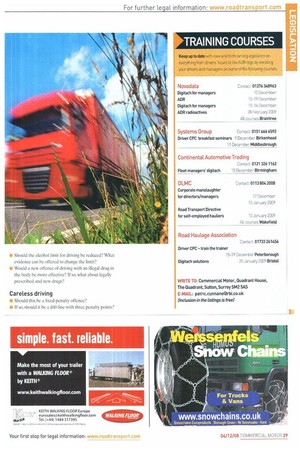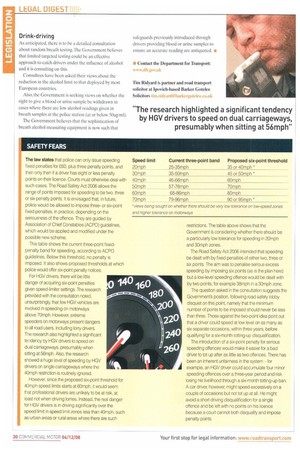Speed trap
Page 28

Page 29

Page 30

If you've noticed an error in this article please click here to report it so we can fix it.
The Government is considering tough new measures to crack down on speeding drivers. Its research shows that lorry drivers are regular offenders on dual carriageways and minor roads.
Words: Tim Ridyard
The Department for Transport (DtT) has published a consultation on speeding, driving when impaired by drugs or drink, careless driving and seat belt misuse. Views are being sought on the proposals by 27 February 2009.
The background accident research and data reveals that while lorry drivers rarely speed on motorways — speed limiters make this impossible — they routinely speed on dual carriageways and minor roads.
The Government has invited responses to the following specific questions, among others:
Speeding
• Should excessive speeders receive six-point fixed penalties?
• Should excessive speeders on low-speed limit roads (20/30mph) generally be given less tolerance?
• Should marginal speeding offenders not be offered two-point, rather than three-point, fixed penalties for low-level offences?
Drink and drugs driving
• Should targeted checkpoint testing for drink-drivers be introduced?
• Should the right to give a blood or urine sample be withdrawn in cases where the breath sample given at the police station is at, or below, 5Oug/ml?
• Should the alcohol limit for driving he reduced? What evidence can be offered to change the limit?
• Would a new offence of driving with an illegal drug in the body be more effective? If so, what about legally prescribed and new drugs?
Careless driving • Should this he a fixed-penalty offence?
• If so, should it be a .00 fine with three penalty points? Drink-driving
As anticipated. there is to be a detailed consultation about random breath testing. The Government believes that limited targeted testing could be an effective approach to catch drivers under the influence of alcohol and it is consulting on this.
Consultees have been asked their views about the reduction in the alcohol limit to that deployed by most European countries.
Also, the Government is seeking views on whether the right to give a blood or urine sample be withdrawn in cases where there are low alcohol readings given in breath samples at the police station (at or below 5Ougint1).
The Government believes that the sophistication of breath alcohol measuring equipment is now such that safeguards previously introduced through drivers providing blood or urine samples to ensure an accurate reading are antiquated. • • Contact the Department for Tnmsport: v,wvt.dfigm.uk
Tim Rid yard is partner and road transport solicitor at Ipswich-based Barker Cotelee Solicitors 11




















































































































































